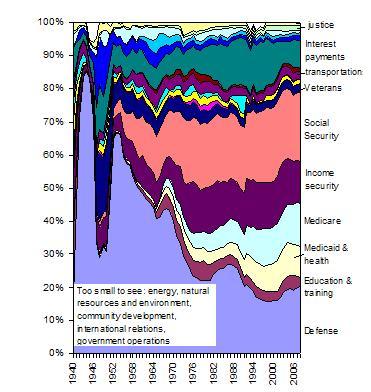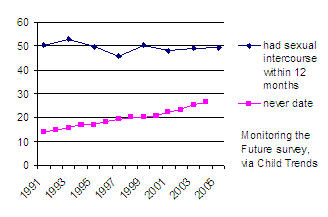It appears that the next presidential campaign will offer several strong but contrasting flavors of populism:
Sam Brownback asserts that Americans’ traditional, popular, moral values are threatened by the “violence, obscenity, and indecency in today’s media,” by “activist judges,” by “foreign suppliers” of oil, and by the federal government. I happen to disagree with almost all his positions, but the Senator does share the majority’s view of several issues, such as prayer in schools.
John Edwards makes the case that we all belong to one economic community, one commonwealth, and inherit our national prosperity not because of what we do as individuals but because of others’ sacrifices, past and present. “We are only strong because our people work hard.” “We are made strong by our longshoremen and autoworkers, our computer programmers and janitors, and disrespect to any of them is disrespect to the values that allowed for America’s greatness in the first place.” Since we belong to one commonwealth, gross disparities in opportunities are unfair.
I used to believe that this position–while morally valid–was a political dead end. Although we had left many Americans in poverty, more than half of all voters were affluent enough that they didn’t need government except for purposes that are always well funded, such as roads and suburban schools. “Redistribution” meant “welfare,” and the welfare system that had developed since the 1930s was justifiably unpopular. Finally, Americans’ were strongly committed to markets and mistrustful of governments.
But several factors make Edwards’ version of populism more promising today. Federal welfare has been deeply cut; the remaining safety-net programs serve large majorities of Americans. The issue has shifted from income inequalities (which Americans tend to tolerate) to huge inequalities in risk. Most people must finance their own retirements while some get huge golden parachutes, exemplifying a new kind of unfairness. Meanwhile, the latest generation of super-rich people has behaved very badly: Paris Hilton is a potent symbol. Not least, John Edwards is a skillful persuader, a litigator who knows how to read a jury and marshal effective evidence and arguments.
Barack Obama so far represents a different strain of populism. He says that we American citizens should play a central role in defining and solving our common problems. We are in a “serious mood, we’re in a sober mood,” and we are ready to work together. “We are going to re-engage in our democracy in a way that we haven’t done for some time, …. we are going to take hold of our collective lives together and reassert our values and our ideals on our politics. … All of us have a stake in this government, all of us have responsibilities, all of us have to step up to the plate.”
For Senator Brownback, the way to assert our values is to pass laws that he favors and that have majority support. For John Edwards, “the great moral imperatives of our time” are to fight poverty and get out of Iraq. For Senator Obama, asserting our values means deliberating together as a diverse population and developing ideas that may be new and unexpected.
In philosopher’s terms, this is civic republicanism, and it’s truly different from mainstream recent liberal politics. To make it work, Obama will have to overcome two challenges. First, he will have to develop an answer for grassroots Democratic activists who are furious at Republicans and consider the Bush administration to be our nation’s central problem. Obama believes that both parties are responsible for marginalizing citizens, and what we need are broader public coalitions. The Senator will have to find a way to talk to Democratic primary voters who are not in the mood right now for non-partisanship and cooperation. Second, Obama will have to find a way to respect the voice of American citizens while also saying something concrete about issues such as health care and taxes. He needs to respect the public’s voice but also perform the main duty of a candidate, which is to put ideas on the table.

